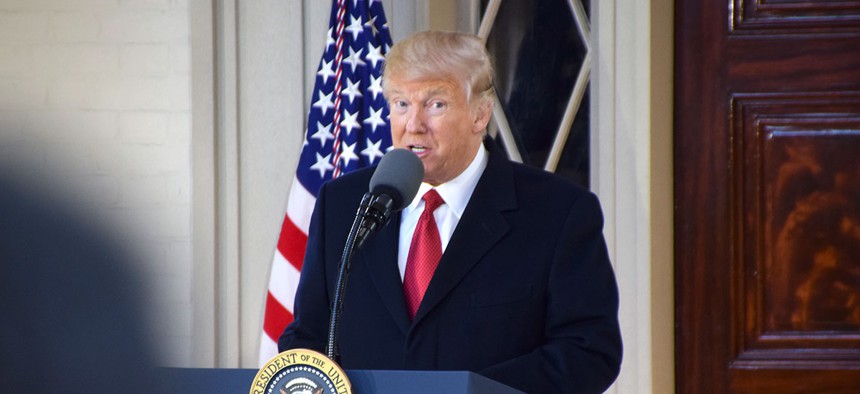
Tennessee National Guard photo
Trump Goes Back To the Future on Foreign Policy
The president’s Syria strike is a small step in reasserting the bipartisan consensus for American leadership on the global stage.
Since World War Two, there has been a broad bipartisan consensus that America must play an active role in maintaining a liberal world order. Even if conservative hawks have been more eager to project force and liberal internationalists preferred diplomacy, there was widespread agreement that America had an essential role in protecting the peace and promoting shared interests. That consensus was threatened in recent years: first, by former President Obama’s instinctive opposition to project American power overseas; later, by President Trump’s aggressively isolationist “America First” rhetoric that captured the enthusiasm of a world-weary conservative base.
Trump’s decision to strike Syria in the wake of Bashar al-Assad’s chemical-weapons attack against his citizens suggests a belated return to normality. It’s a consequential moment in Trump’s presidency, since the president’s quick intervention was at odds with much of what he’s said for years about foreign affairs. In 2013, he slammed President Obama for considering military action against Syria. On the campaign trail, he consistently expressed a subtle admiration for authoritarian leaders. He frequently criticized George W. Bush’s intervention in Iraq. But in the Rose Garden on Wednesday, he hinted that he was taking a new tack. “If the world changes … well, I do change, and I am flexible, and I’m proud of that flexibility,” Trump said.
Trump’s apparent volte-face also suggests that the more experienced hands in the administration—namely, Defense Secretary James Mattis and national security adviser H.R. McMaster—are gaining clout over those with more heterodox views on foreign policy, such as Stephen Bannon. And Trump’s limited use of force in Syria won the support of our close allies, once-critical hawkish senators such as John McCain and Lindsey Graham, and even the grudging support of leading Democrats in Congress. Politically speaking, it showed there’s a broad consensus for strong American leadership—even if it’s triggered by a Johnny-come-lately like Trump.
Obama was the opposite of Trump: facile with words, but flaccid with his actions. He gave a stirring national address on the need to hold Syria accountable for using chemical weapons, but never did anything to punish Assad. Just before leaving office, he bragged about breaking the foreign policy establishment (a group he claimed prefers “militarized responses.”) His leading foreign policy adviser, Ben Rhodes, famously dismissed the bipartisan roster of foreign policy experts in Washington as a “blob” for “whining incessantly about the collapse of the American security order in Europe and the Middle East.” Obama’s deep popularity with an increasingly anti-war base reoriented the Democratic Party in his image. The Obama White House staff was filled with ideologically driven loyalists eager to translate the former president’s norm-breaking vision into practice.
It’s ironic that Trump is routinely (and legitimately) faulted for norm breaking while his predecessor’s open contempt for bipartisan foreign policy traditions was largely overlooked. What’s even stranger is that a chastened Trump is the president who is the one bringing America closer to its bipartisan foreign policy roots.
TRAIL MIX
1. Rep. Ann Wagner is stepping down as the National Republican Congressional Committee’s finance chair, the clearest sign that she’s preparing a run against Sen. Claire McCaskill in Missouri. Wagner helped the NRCC raise nearly $36 million in the first three months of the year, an impressive haul considering her statewide ambitions.
If she runs for the Senate, she’d become the party’s top recruit for the 2018 midterms. Wagner represents a suburban St. Louis seat, has a track record of raising the millions necessary to challenge a sitting senator, and would add some needed diversity to the GOP’s Senate caucus. (Of the 52 Republican senators, only five are women.)
McCaskill had the good fortune to run against blundering Republican Todd Akin in her last election; she was headed for defeat if Republicans had nominated a more competent challenger. Missouri has only gotten more conservative since 2012, handing President Trump a 19-point victory in last year’s election. Unlike her red-state Senate colleagues, McCaskill was an enthusiastic surrogate for Hillary Clinton’s presidential campaign, giving Republicans plenty of fodder to use against her in the upcoming campaign
2. The Cook Political Report published its annual Partisan Voter Index this week, complete with a must-read analysis by House-race editor David Wasserman. The most important finding: The number of swing districts has consistently shrunk over the past couple of decades. Only 72 of the 435 House seats are rated competitive (PVI of R+5 and D+5), less than half of the number of swing seats (164) in 1997. In the past four years alone, the number of swing seats has declined 20 percent.
But Wasserman wrote that ideological self-sorting—not gerrymandering—was the main culprit for the decreasing competitiveness. People are either choosing to live alongside like-minded people, or are changing their partisan views to conform to the prevailing views of their neighbors. Wasserman found that a whopping 83 percent of the swing-seat decline stems from “the natural geographic sorting of the electorate,” while just 17 percent comes from gerrymandering.
It’s another reminder that line drawing isn’t why Democrats have been unable to win back control of the House for the past three elections. The obstacles for the minority party are real, but the solution to regaining a House majority is to win over more moderate voters—or perhaps rely on Trump’s unpopularity to do the job for them.







